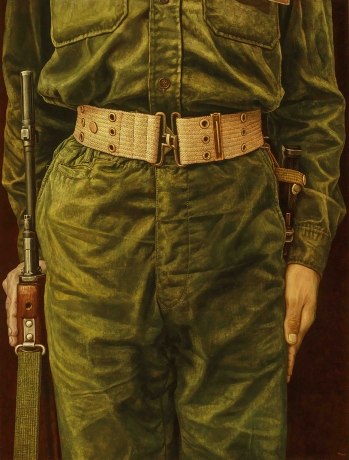EXHIBITED:
Majestic Island - The Development of Modern Art in Taiwan , China Art Museum, Shanghai, 22 April - 22 May, 2013 Tzu-chi Yeh Solo Exhibited - Monolog , Impression gallery, Taipei, 8 Aug. – 1 Sep., 1992
ILLUSTRATED:
Tzu-chi Yeh , Venice, Impression gallery, Taipei, 1992, color illustrated, p 12
Catalogue Note:
Tzu-chi Yeh completed this painting while overwhelmed with grief following the death of his father in 1989. In many of his portraits, Tzuchi Yeh uses a partial presentation of the subject, rather than seeking to depict the human figure in its entirety. In this painting, only the torso of the soldier is seen, viewed from an angle which suggests a young boy looking up at his father,
who occupies almost the whole of his field of view, so that there is no escape from his image. The solider in the painting stands proudly erect, fists clenched, with one hand gripping his rifle and the other pressed close against his thigh. His slim figure stands at attention, with a posture that gives no indication of slackness or casual ease. The exquisitely applied dark green gives a completely different impression from the paintings of lush vegetation that Tzu-chi Yeh produced in Yuli later in his career; there is an additional sense of stability and human warmth. The way in which the light strikes the folds in the soldier's uniform, revealing that it has been worn for some time, is a tribute to Tzu-chi Yeh's painterly skill. The brash, martial tone of the painting is offset by the contrast between light and dark, suggesting the passage of time; there is also a powerful, ineradicable feeling of nostalgia.
"Salute to My Father and Brother" was painted not long after Yeh's starkly realistic "Bathroom Nostalgia" series of the 1980s. In both cases, there is a nostalgic commemoration of Yeh's parents and his hometown. In 1983, Yeh had exhibited a number of realist works with soldiers as its subject matter. This painting was completed in 1992 and reflects a further refinement of techniques that Yeh had achieved during the intervening decade. Yeh's unique style of realistic composition closely intertwined with key aspect of human life, together with his passionate yet introspective personal philosophy, combine to create detailed,
"classical" works that effectively mix the emotional, the spiritual, and visual impressions in a complex, ambiguous relationship.
In his article The Traps Faced by the Unwary when Interpreting Realist Paintings – A Case Study of Tzu-chi Yeh's ‘Bathroom Nostalgia' Series, Chang Hsin-lung noted that:
"On the face of it, art whose subject matter is depicted realistically might seem to be the easiest form of art to understand. However, when creating a realist painting, the artist often adds in elements from their own philosophical outlook, adding complexity to the process of interpreting the painting. To facilitate accurate interpretation, the important thing is to distinguish between the obvious, readily apparent meaning of the work, and the meaning that the artist is seeking to endow it with."
Bearing Chang's remarks in mind, Upon a closer examination of Tzu-chi Yeh's art, we can see that the significance of his work is not limited to the employment of the classical realism style of the 1990s, or to his refined, more precise brushwork; there is also an emotional power and sadness that cannot be easily explained and interprete. Through detailed analysis of the logic
that underpins the paintings, it becomes apparent that the calmness of Yeh's paintings conceals an irrepressible energy, like a volcano waiting to erupt. Beneath a mountain-peak of seemingly eternal stillness there lies an immense, roiling heat; the uncontainable feelings of nostalgia and loss could at any time erupt out of the "volcano" into the real world.
For everyone and everything, being together means double happiness, and separation means double misery. After 19 years of wandering, in which he travelled from Yuli in Taiwan to New York, in 2006, like a migratory bird returning to its birthplace, Yeh finally came back to his hometown of Yuli to paint there. The soldier's erect torso in this painting seems to represent a departure from Yeh's life in New York; the painting carried an inexpressible sense of homesickness, as well as a play of light and shadow that somehow embodies the familial affection Yeh had experienced in the past. Underlying what appears on the surface to be a painting with a very serious subject matter, there actually lie a series of warm memories of family togetherness which make themselves felt in a myriad of different ways. While Tzu-chi Yeh is best-known for his still lifes and landscape
paintings, this portrait of his father as a soldier is surely one of Yeh's finest works.
"Salute to My Father and Brother" was selected to represent Tzu-chi Yeh's work in "Majestic Island - The Development of Modern Art in Taiwan" held in April – May 2013 at the Shanghai Art Museum, which also featured works by other noted artists
such as Chang Dai-chien, Chu Teh-chun, Huang Chun-pi and Chen Cheng-po.
